Soft fruit: trends and opportunities in a unique value chain
In this YEALD Neaws, we dive into the soft fruit market, in the Netherlands and on an international scale. We see soft fruit as a special part of the larger agricultural and horticultural sector.
Rapid developments and strong preferences of consumers and society are translated through retailers and growers to breeders, who have long-term processes to develop new varieties. This creates unique dynamics in the chain, and growers have an essential position as a pivotal point where everything comes together. New business models and virtual chain integration are the
PAGE 2
Dynamic chain
The unique aspects of soft fruit create a specific value chain.
PAGE 4
Genson and Royal Berry
How Dutch companies Genson and Royal Berry keep a grip on the chain.

results. And all that is increasingly organized internationally, in a market that ultimately has to meet the demands of consumers at a local level. In this edition of our market update, we enter into discussion with several companies within the soft fruit chain; all of them successful entrepreneurs who give us a look behind the scenes, from which we get valuable insights. We talk to the Spanish breeder Planasa, the Dutch grower and young plant grower Genson, the Southern European grower Surexport and the Dutch grower Royal Berry. By putting together their similarities, differences, and business strategies, we get a clear picture of the soft fruit market and main trends. We end with an introduction of our new employees, because we continue to move forward. Enjoy reading this edition of YEALD Neaws! <<
PAGE 7
Surexport and Planasa
How do you become a top player in the international soft fruit market?
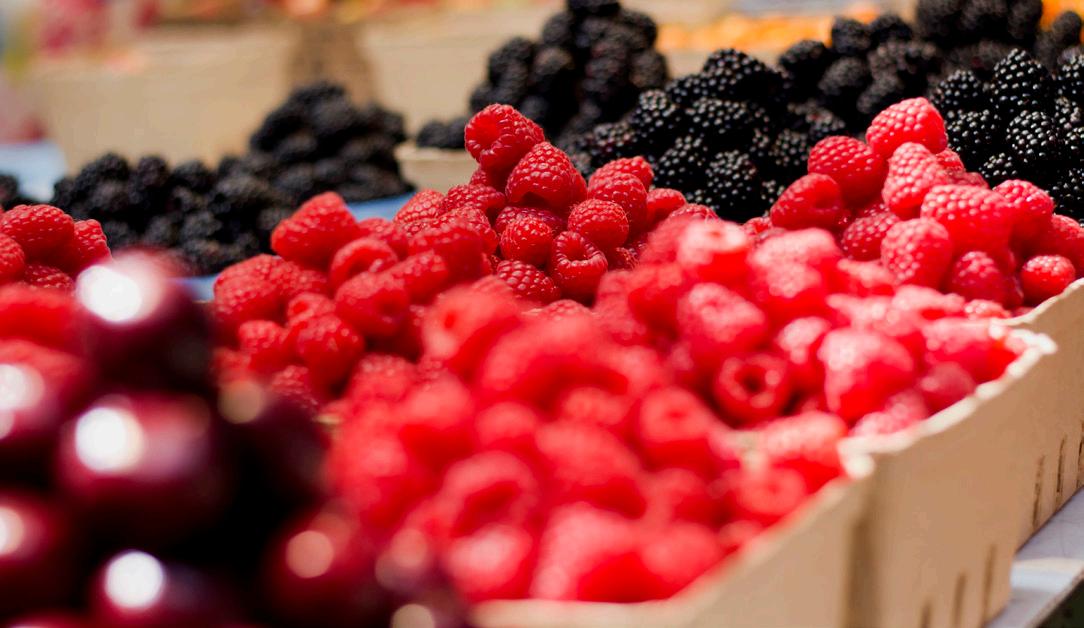
PAGE 10
New names
At YEALD, we also continue to grow. We introduce two new names.
>>
BUSINESS NEAWS UPDATE 2023 .1
YEALD NEAWS YEALD
VISIT LINKEDIN VISIT WEBSITE
Our view THE UNIQUE ASPECTS OF SOFT FRUIT CREATE A SPECIFIC VALUE CHAIN
The cultivation of soft fruit has a bright future. The market is booming. Blueberries, blackberries, raspberries, and strawberries are all very healthy and sometimes even called superfoods. They are at the front of the mind of the consumer, who prefers them to be sustainably grown and want them to be available year-round. So retail is looking for the tastiest varieties, sustainably produced by growers who want to deliver all year round and in line with the taste of the local consumer.
It is a sector with great opportunities and a relatively high level of equal standing between the parties. But these great opportunities also have a downside: large investments are required to continue to participate in the dynamic chain of soft fruit. Let’s start at the beginning. What does the soft fruit value chain look like? The breeders are at the front of the chain. They are constantly developing new varieties that can be grown more sustainably, are more resistant to diseases, or are more robust when it comes to climate change. They also look at things like taste, size of the fruit, and whether the variety is profitable to grow. Developing new genetic varieties takes between seven and fifteen years and is therefore a capital-intensive business.

After the breeder comes the propagator, who grows young plants through genetics. The better the plant, the easier it is for the grower to get high quality and quantitative fruit, and therefore a better yield. The grower is the next step in the chain, after which the fruit ends up in retail via distribution centers. Within the value chain, we see various business models and different strategies and positioning of companies at each step.
For example, some breeders skip the growers and offer their genetic varieties directly and exclusively to retailers, after which growers are sought who can take care of production. These so-called “club deals” ensure a stable link between breeders and retailers and a certain degree of security in terms of purchase and turnover. Retailers are increasingly leading in the chain and are looking for partners to secure supply.
Then there are the growers, who have found a leading position in the chain in terms of size and expertise. They decide for themselves or together with retailers which genetic varieties they want to grow, have a clear go-to-market strategy, and organize sales themselves. Some opt for security and go for permanent contracts with a select group of retailers, while others deliver to a wide mix of retailers combined with day trading. In both cases, this requires close collaboration between the growers and retailers on the one hand, and the growers, propagators, and breeders on the other. In this respect, large growers are increasingly taking the position of director in a virtually integrated chain.
Finally, there is the retailer, who has several very clear requirements. These requirements differ per region, but some requirements are the same for all retailers: shelves

>> >>
YEALD BUSINESS NEAWS UPDATE 2023 .1 /2
VISIT LINKEDIN VISIT WEBSITE
that are filled year-round, a long shelf life, and good taste. So that is what retailers are looking for when they decide on their genetic varieties and their partnership with growers. These relationships are increasingly longterm, although commitments and guarantees differ per retailer but also per grower.
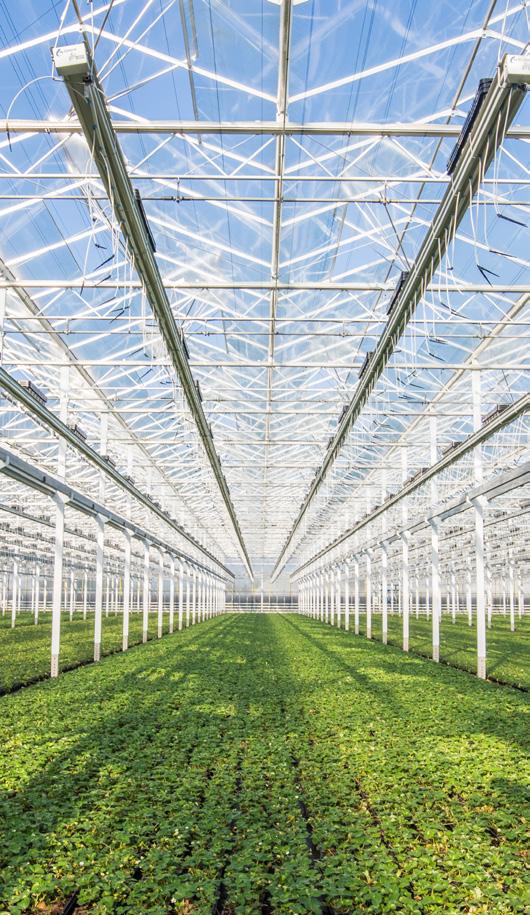
What is clear is that consolidation and (virtual) chain integration are also trends within the soft fruit sector. Consolidation and integration are on the rise, with breeders and growers using more genetics, greater volumes, and more hectares, but we are also seeing a broadening of the value chain, such as with growers who want to produce young plants, or breeders who want to take part in that process. However, the majority of companies opt for close collaboration within the chain. They focus on one, or at most two aspects, position themselves as chain directors and then work closely with one or more other parties in the value chain to guarantee a certain amount of supply or sales. Especially given the long lead times involved in developing genetic varieties or growing young plants, this guarantees a certain degree of business continuity (and cash flow). There will always be a place for specialists within soft fruit, but scaling up is necessary to be able to afford the investments that are needed to produce large volumes uniformly and all year round and to be the chain partner for retail. This often happens on an international scale. The uniqueness of soft fruit – except for blueberries – is that the shelf life requires regional production. Producers cannot be too far away from the consumer. And the young plants are usually not suitable for intercontinental transport. This means that large growers focus on their region and sell the product within a maximum of a day’s drive. Consolidation will therefore take place on a European scale. In the long term, the European market will consist of a limited group of large growers who can and will fulfill the role of chain partner. Breeders can operate worldwide, but will then have to set up facilities on every continent for effective distribution and in order to develop the required genetic varieties per market.

This unique aspect of soft fruit ensures specific chain integration. We see parallels with other sectors, but lessons learned from the soft fruit sector cannot be copied one-on-one. We do see a clear and direct relationship between retailers and growers who are strengthening their ties and as such organizing their sales together. In addition, we see growers who are integrating backwards to optimize their cultivation via young plants. We have also noticed that parties in the chain are looking for equal standing, both within the chain and with competitors. No one is looking for a monopoly or excessive dominance or power. In our view, this has to do with the almost contradictory timeline of the development of genetic varieties versus the shelf life of the final product. From grower to retailer, the time span has to
be short, and there are always many gaps to close. But from breeder to grower, things have to go very slowly and must be planned years in advance. In both cases, equal standing between parties creates a win-win situation for everyone, and chain integration through close collaboration is essential for the further development of the sector and the success of everyone. <<
>> >> >> YEALD BUSINESS NEAWS UPDATE 2023 .1 /3
“We have also noticed that parties in the chain are looking for equal standing, both within the chain and with competitors.”
VISIT LINKEDIN VISIT WEBSITE
How Dutch companies Genson and Royal Berry keep a grip on the chain
‘SOFT FRUIT IS A SECTOR IN WHICH A LOT IS HAPPENING’

Soft fruit has special features. The fruit itself is fragile and has a short shelf life; blueberries have a longer shelf life than strawberries, and raspberries have the shortest shelf life of all. There is great time pressure on logistics after harvesting. At the other end of the chain, in breeding and cultivation, one counts in years. The development of new varieties takes about seven to ten years, and the parent material for the strawberries that will be on the shelves in 2025 is already being collected now. Covering this length of time makes for a fascinating chain, in which progressive companies all try to get a grip on it in their own way.
Genson in Sint-Oedenrode and Royal Berry in Bemmel gave us a glimpse of their strategy and vision for the cultivation of soft fruit.
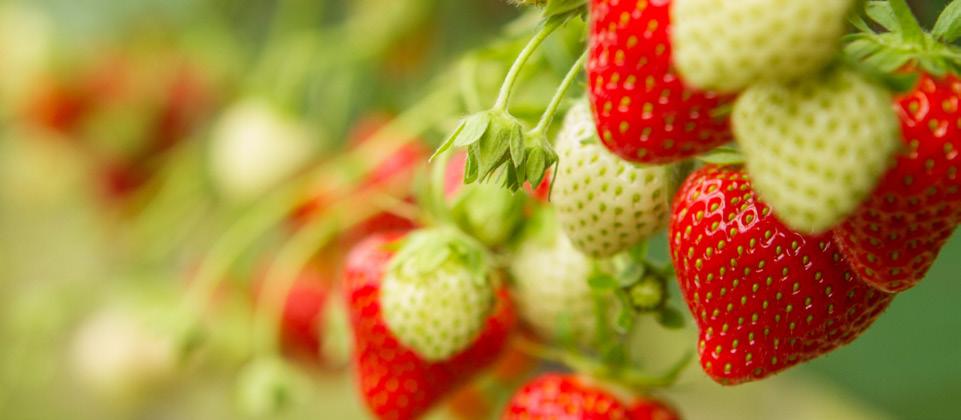
The field of tension for the entrepreneur “Soft fruit is a sector in which a lot is happening,” says Jan van Genderen, Managing Director of Royal Berry. “Our mission is to grow a reliable and good quality of soft fruit for the consumer. After eating one of our strawberries, the consumer should already want to have another one. To this end, we work as closely as possible with various retailers. For us, it is key to work with as many parties as possible. Some of our customers have an entire annual plan ready, including all action points, and with others you work on a more ad hoc basis, which
means you have to anticipate more. The first offers us a degree of security, the second great opportunities. The combination works perfectly for us. As an entrepreneur, you want to look for that field of tension.”
Genson also spreads its opportunities but does so within the value chain instead of among retailers. “We work together with Albert Heijn for the sale of our fruit and Bakker Barendrecht plays a big role in this as service provider” says Frans de Vogel, Managing Director of Genson. “In addition, we sell soft fruit plants to customers throughout Europe, Morocco, and even the United Arab Emirates. Our plant sector is not tied to one supplier of genetics, which gives us room to maneuver. Because of our interdependency with Albert Heijn, we determine together which genetic varieties we will

>> >> YEALD BUSINESS NEAWS UPDATE 2023 .1 /4
VISIT LINKEDIN VISIT WEBSITE
grow, but we have consciously chosen not to go into genetics ourselves. We do, however, take control of the chain together. Having said that, there is a clear distinction between plants for cultivation for Albert Heijn and the commercial market”
Scaling up to maintain equivalence

“To guarantee quality and continuity in retail, we work with about five varieties all year round,” says Jan, as he explains how Royal Berry is entering the market. “The goal is to grow two varieties at the same time, spread over our facilities. This is challenging because each variety has its unique characteristics and cultivation technique. In addition, over time, the availability of varieties shifts, customers constantly set new requirements and the cultivation technique also changes. The latter is also the reason why we are going to grow with LED; to be able to guarantee quality all year round.”
“Our starting point is that we must remain an interesting party for breeders and propagators,” Jan continues. “We are a good platform for new varieties, which is why we do not opt for one supplier. The level of our cultivation technique and our scale, combined with the competition
Genson
Genson was founded in the early 60s by Marinus and Ellie van Gennip, who grew various crops in open fields. Their sons all started working in the company. All four had their own unique character, which was reflected in the various positions they held within the company.

between genetics suppliers, ensures equivalence in our relationship with breeders. As far as we are concerned, it is fine for the retailer and breeder to work closely together. As a grower, we can act as independent experts within such constructions and give advice. In that respect, we are happy to be a partner of both breeders and retailers. That is the driving force behind our increasing scale, so that we can serve several customers with high-volume, high-quality products.”
A static market full of quick decisions
“There is no chain monopoly, so collaboration is necessary,” says Frans, who will be supplying strawberries to Albert Heijn all year round with Genson next year. “But to be an equivalent partner, you need to be of a certain scale with which you can guarantee professionalism, R&D, and a some degree of security. Consumers are demanding more and more and will not accept an empty shelf of soft fruit. That is why we have kept the vital processes in our own hands, such as the cultivation of young plants and a testing greenhouse to test new varieties and cultivation techniques. We also invest a lot in modern technology.”
“It is a time consuming process, because of the very
The company grew, became more modern, and was progressive. Genson was one of the first to move strawberries from open fields to cultivation on racks under protective covers, tunnels and greenhouses. Genson is now one of the larger strawberry growers in the Netherlands and also one of the largest producers of soft fruit plants for the European market. They work closely together with Albert Heijn in the marketing of their strawberries, and Genson sells 5,000 tons of strawberries and 120 tons of raspberries a year to Albert Heijn.

The company is still in the hands of the founding family, with the day-to-day management being done by a management team. In addition, father and son, Marco and Mari van den Heuvel, and grower, Bart Goorts, have joined the company. According to Managing Director Frans de Vogel, the Van Gennip brothers still prefer to work in the operations of the company, each with their own specialism.
long lead times of genetics and young plants,” Frans continues. “And that is risky. Moreover, it requires a lot of capital to grow a large number of plants, cultivate the soft fruit and get the product to the consumer. We use our expertise in this field to closely guide the growers in making quick and wise decisions. It is important for us to work closely together, especially with the increase in available genetics in recent years.”
>> >> YEALD BUSINESS NEAWS UPDATE 2023 .1 /5
VISIT LINKEDIN VISIT WEBSITE
“Our starting point is that we must remain an interesting party for breeders and propagators.”
“Companies with genetics are looking for reliable partners and producers,” Frans explains. “This is logical, because producing new genetics requires an enormous investment of money and time. This leads to ‘club deals’, in which breeders sign off agreements with retailers to ensure the success of their genetics and in which growers are then sought to take care of production. The danger of such a construction is that the producer ends up drawing the short straw, despite the amount of work that goes into growing. At Genson, we are turning that around; together with our regular retail partner, we are going to start looking at genetics.”
Developments in the coming years

The future of soft fruit looks good. It is a growing market. But the growing demand creates tension in the chain, pressure on technological innovation, and rapid switching in a process where developments sometimes take a decade. Retailers are being impacted as well, and therefore many retailers are looking for a leading value chain partner with sufficient scale and knowledge.
“In the short term, inflation will cause the consumer’s wallet to shrink,” predicts Jan. “And the energy crisis is of course putting pressure on illuminated cultivation in the Netherlands. Nevertheless, we choose to turn on the lights. We have a long-term vision, so we just keep going. In the long term, the market for soft fruit will continue to grow. The consumer wants healthy, tasty, reliable, and easy fruit. There will be a trend towards fuller and firmer varieties and of course far-reaching sustainability in the cultivation systems. If we, as growers, continue to provide a good product on the shelves all year round, the opportunities will only increase.”
“Soft fruit will largely remain a regional crop,” Frans foresees. “This is due to the shelf life of the fruit after it is picked. But with our plant sector, we are also interested in the global market. That is why we have entered into a joint venture with a former strawberry grower in the US, with who we will grow our plants for the North American market. Dutch plants, Dutch cultivation technology, adapted to the North American market.”
“We have our own internal development team comprising young and well educated people,” Frans concludes. “With this team, we think about cultivation ten years down the line. All kinds of concepts are being discussed, from cultivation in layers to indoor farming. It keeps us focused on innovation and development. Sustainability, efficiency, and uniformity are in any case key. We sell our residual product to the food industry who process it for example into jam, juices and concentrate. Recently, we started processing it ourselves into liquor, gin and bubbles, under the brand ODAVI. We want to put the distilling equipment in our warehouse so that the residual product is processed on our own site. By marketing the residual product, you also create sustainability.” “All roads lead to Rome,” says Jan, summarizing his vision. “There are as many models as there are entre-
Royal Berry
Royal Berry in its current form was started in 2010 by Jan van Genderen, who converted a former tomato greenhouse of 6.5 hectares in Bemmel into a strawberry greenhouse. Before that, he had learned the trade from his father, who once had a hobby greenhouse that Jan was allowed to run from the age of twelve.
From cultivation technology to building installations yourself, Jan has learned everything on the job. In 2010, Jan Royal Berry created a new team and organization, following his own vision. Royal Berry is now one of the largest and leading growers of strawberries in the Netherlands, with 57 hectares of business, of which 35 hectares are for greenhouses, 12 hectares being illuminated, and 22 hectares of tunnels without heating.
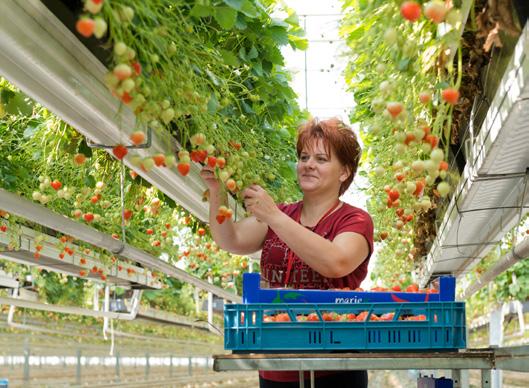
Since 2010, the focus has been entirely on retail. This drive has ensured the growth that is necessary to remain an equivalent partner of retailers and still be interesting for breeders. Royal Berry wants to supply a range of customers with high volume at high quality.
preneurs. Fifteen years ago, I heard Erik Hulzebosch say that you should do what you enjoy doing because you are often good at that. And I enjoy growing strawberries on a large scale. The work is never finished, certainly not in the soft fruit sector. Every day is a challenge. But I’m very positive about the future.” <<

>> >> >> YEALD BUSINESS NEAWS UPDATE 2023 .1 /6
VISIT LINKEDIN VISIT WEBSITE
“Every day is a challenge. But I’m very positive about the future.”
HOW DO YOU BECOME A TOP PLAYER IN THE INTERNATIONAL SOFT FRUIT MARKET?


The consumption of soft fruit is growing worldwide. This means that the value chain is becoming increasingly international and we also have to look beyond the borders of the Netherlands to analyze the market, the value chain, and the future. What are the trends and what challenges are the big players facing? We sat down with Michael Brinkmann, CEO of Spanish-French breeder & propagator Planasa, and Andrés Morales Vilar, CEO of the large Spanish soft fruit grower Surexport, to hear their vision on the international soft fruit market.
“We are first and foremost breeders,” says Michael Brinkmann when we ask him how he would describe his company. “The plants are not suitable for long transport, so we produce all the plants close to our customers. Planasa has a head office in Madrid where about fifteen people work, but it employs a total of four thousand people who work at largely autonomous facilities on three continents. The breeding is organized regionally with local expertise. The Madrid office mainly determines the overall strategy, which is adapted per region to the wishes and requirements that apply there. There is weekly contact between the regional facilities and management, and everyone shares the same goal: to be
the best soft fruit breeder in the world.” “We are first and foremost growers,” says Andrés Morales Vilar, when we ask him the same question as Michael. “Our goal is to be one of the most important soft fruit growers on the European market. We do this from various locations in Spain, Portugal, Morocco, and nowadays also Kenya. The European market is not one homogeneous market; consumers in Germany want something very different to consumers in Italy, in terms of price, quality, and taste. We always look at the winwin situation that we can create as a grower for both the breeder at the beginning of the chain and the retailer at the end. So collaboration within the chain.”
>> >>
YEALD BUSINESS NEAWS UPDATE 2023 .1 /7
Spanish grower Surexport and breeder Planasa explain their own strategies
VISIT LINKEDIN VISIT WEBSITE
Market-driven genetics
Planasa also works closely with others in the value chain. “Transparency in the chain is essential for the success of all parties,” says Michael. “It is useful if everyone knows the strengths and weaknesses of a variety, and if we all know what is going on with the consumer and what wishes the retail sector has. Several characteristics can be seen in all markets, such as the shelf life, the resistance to disease, the yield for growers, and the quality and taste of the consumer. But some characteristics are very specific per market, which is why we breed through our regional facilities. Also our technical support team ensures proper crop management to make the most of our genetics.”

There is a tendency to reverse the chain, with retailers going back into the chain to determine production and gain exclusive access to specific breeding programs. “I understand the idea behind it,” Michael explains, “but what do you do if the variety from the breeding program that you invested in does not deliver the highest quality for growers or consumers? Then you have spent ten to fifteen years developing exclusivity for nothing. I also think it is important that the grower determines what he wants. So as a breeder we are very clearly committed to a market-driven approach to genetics. Competition and transparency in the chain mean that, on the whole, there will be higher quality for everyone, and that’s what you want, in my opinion.”
Relevant through size
Surexport is a grower who, thanks to economies of scale, has become a major player in the market and therefore an equivalent partner for both breeders and retailers. “Twenty years ago, all our fruit went to the Netherlands and from there to, for example, end customers in Poland,” Andrés explains. “Now we are big enough to deal directly with that end customer. Consolidation and scaling up are necessary because then you can offer the service that is expected in retail. We are relevant for both breeders and retailers because of our size. We can invest in quality, service, and development and can therefore grow and deliver what and how the customer wishes.” “Vertical integration in the chain is therefore mainly seen in the form of close-knit collaboration,” continues Andrés. “We always look for the best varieties that match the customer’s needs. In that respect, we are a perfect link between retailer and
Planasa
Planasa is originally a Spanish-French breeder and propagator with facilities all over the world. They believe that new varieties should be developed close to their customers. That´s why they have R&D centers in the main production regions in the world. Planasa produced some soft fruit themselves in the past but they gave this up in order to focus entirely on breeding. For its international growth, Planasa receives support from the private equity fund Cinven.

There are three pillars for Planasa. First, the company wants to be the best soft fruit breeder in the world for the four main berries. They develop varieties of strawberries, blackberries, blueberries, and raspberries in America, Europe, and Asia. In addition, they have several cultivation companies to guarantee that their genetics end up in high-quality young plants. There is also technical support, which ensures that their customers have direct access to knowledge about varieties, cultivation, and region-dependent expertise.

>> >>
YEALD BUSINESS NEAWS UPDATE 2023 .1 /8
“We can invest in quality, service, and development and can therefore grow and deliver what and how the customer wishes.”
VISIT LINKEDIN VISIT WEBSITE
“Transparantie in de keten is essentieel voor het succes van alle partijen.”
breeder, and a good partner at both ends of the chain. Our size, expertise, and service are our added value in the chain, in addition to the quality of the products we grow.”
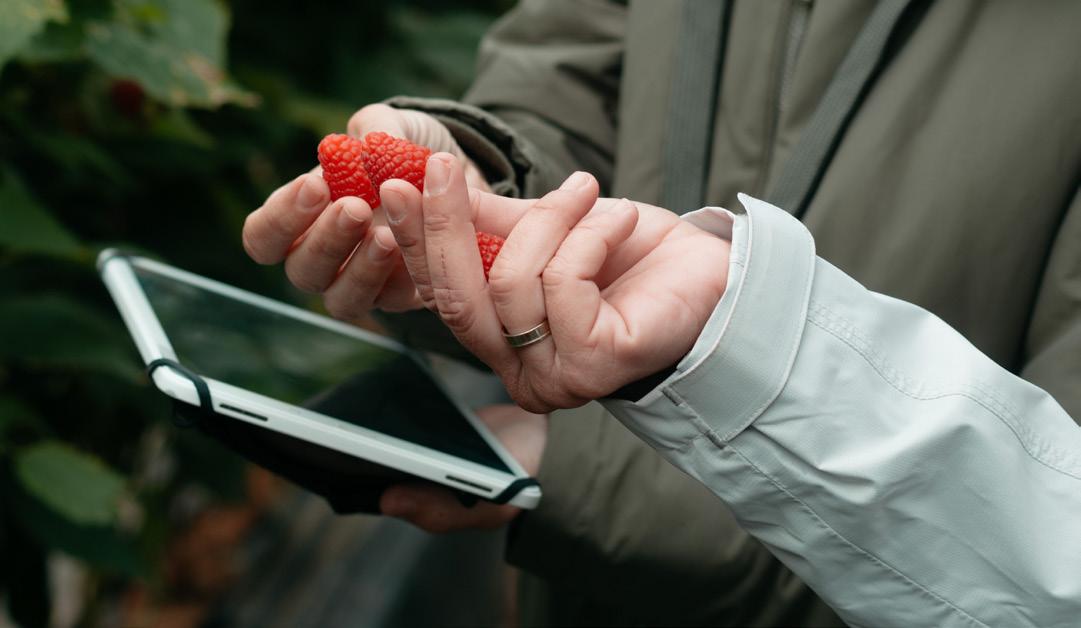
Growing market, healthy competition

Soft fruit is a sector with long lead times for new varieties because it simply takes an average of ten years to develop a new variety that is ready to be cultivated. Despite this unwieldy aspect of the sector, both Michael and Andrés see several clear developments. “We are going to grow better quality with increasingly fewer raw materials,” says Michael. “You also see an increase in new technologies, such as growing on hydroponics or crop sensing so that you have the data to take quick decisions. The demand for soft fruit will continue to rise, with people expecting an ever longer shelf life, yearround availability, and less waste.”
Andrés endorses the trends that Michael mentions. “It’s superfood and a market that continues to grow,” he adds. “Nowadays, there are a lot of excellent breeding programs and many very good varieties on the market. This provides us, as growers, with many options. This growth also means that more and more money is being invested in the sector from outside, so consolidation and innovation remain essential for producers. There will certainly be room in Europe for smaller growers with exclusive varieties and exclusive customers, but we mainly see added value in our size. This is also necessary for the retail market.”
“Above all, you have to do what you are good at, where your focus is, also in the soft fruit sector,” concludes Michael. “And so, as a breeder, we are not going to fight our way into areas of the chain that have nothing to do with us. That wouldn’t bring us further. As far as we are concerned, there is healthy competition between breeders and within the value chain, ensuring higher quality and providing a place where everyone can earn money. Ideally, this is how it should be.”<<
Surexport

Surexport is a Southern European soft fruit grower, with cultivation facilities in Spain, Portugal, Morocco, and Kenya. They supply large European retailers year round, even in winter. The company was founded in Huelva, Spain, in 1994 and has grown into one of the largest independent soft fruit growers in Europe. Surexport produces strawberries, blueberries, raspberries, and blackberries.
About eighty percent of their produce is exported, through long-term and solid commercial partnerships with the top European retailers. Surexport has a highquality logistics facility and packaging halls, including a fully automated hall in Huelva. The company wants to grow internationally to maintain its leading position in retail in the long term and to be able to deliver a highquality product. It is supported in this by Alantra Private Equity.
>> >>
YEALD BUSINESS NEAWS UPDATE 2023 .1 /9
“Our size, expertise, and service are our added value in the chain, in addition to the quality of the products we grow.”
VISIT LINKEDIN VISIT WEBSITE
AT YEALD, WE ALSO CONTINUE TO GROW
The horticulture sector is growing and on the move, so YEALD is also growing. Where we see an increasing scale in the market, we are also scaling up ourselves to be able to optimally use the proper knowledge and expertise for our customers. That is why we have two new employees, who will strengthen us in the field of valuation issues and analysis.
Jerry van Leent has twelve years of M&A experience and will join our M&A team as Director of M&A and Register Valuator. We are thrilled! Jerry comes from the merger and acquisition office of Van Oers Corporate Finance but has his roots in the Westland. As a gardener’s son, he ended up at Van Oers in Breda through the Hotelschool The Hague and Nyenrode Business University. As a manager, he was responsible for ten people, who supervised about 15 national and international transactions per year.
With his switch to YEALD, Jerry has returned to the region where he has his roots. He is registered as a Register Valuator, which will now allow us to tackle valuation issues in-house. The knowledge, the network, and his love for the sector make Jerry a great asset to YEALD.

In addition, Lars van Marrewijk has joined us. He also grew up among greenhouses. After his education at the Rotterdam School of Management, with an MSc. in Strategic Management, Lars worked for a year as a financial analyst at Schiphol. Then the lure of the Westland and the hortibusiness became too big to ignore any longer. Lars joins YEALD as an analyst in the M&A team. As a native
Westlander, he knows the hortibusiness well and he sees YEALD as a great place to achieve his ambitions. Lars’ enthusiasm and knowledge will certainly be appreciated by our business partners.

With these two brand new employees, their ambition, and their knowledge, we are even better able to serve our existing and new business partners. With their roots in the hortibusiness and the financial sector, they are two great assets for our company. <<
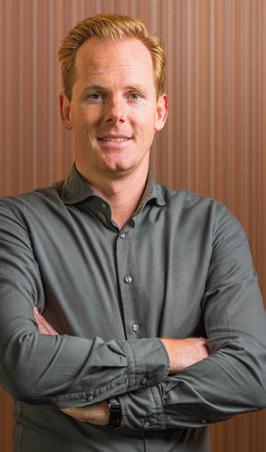
>> YEALD BUSINESS NEAWS UPDATE 2023 .1 /10 Boswoning 4a 2675 DZ Honselersdijk +31 174 75 25 00 www.yeald.nl Rob van Leeuwen +31 6 51 62 41 08 rl@yeald.nl Robin Berendse +31 6 24 20 10 10 rb@yeald.nl Arthur Vijverberg +31 6 40 55 04 61 av@yeald.nl Roger Gerritzen +31 6 12 52 38 18 rg@yeald.nl
Jerry van Leent and Lars van Marrewijk join the M&A team at YEALD
Jerry van Leent
Lars van Marrewijk
VISIT LINKEDIN VISIT WEBSITE
“With their roots in the hortibusiness and the financial sector, they are two great assets for our company.”




















